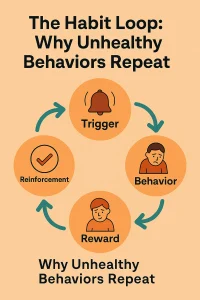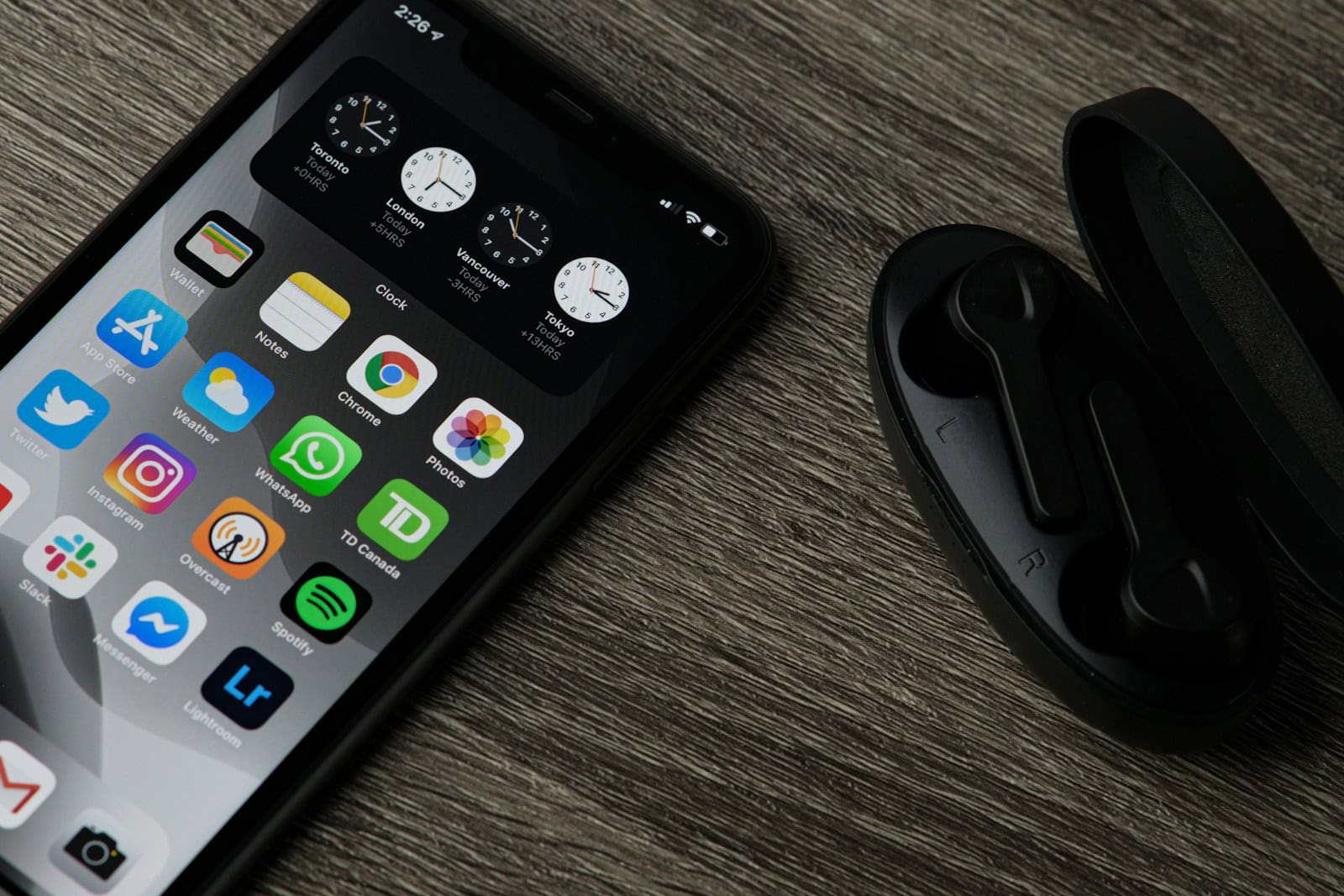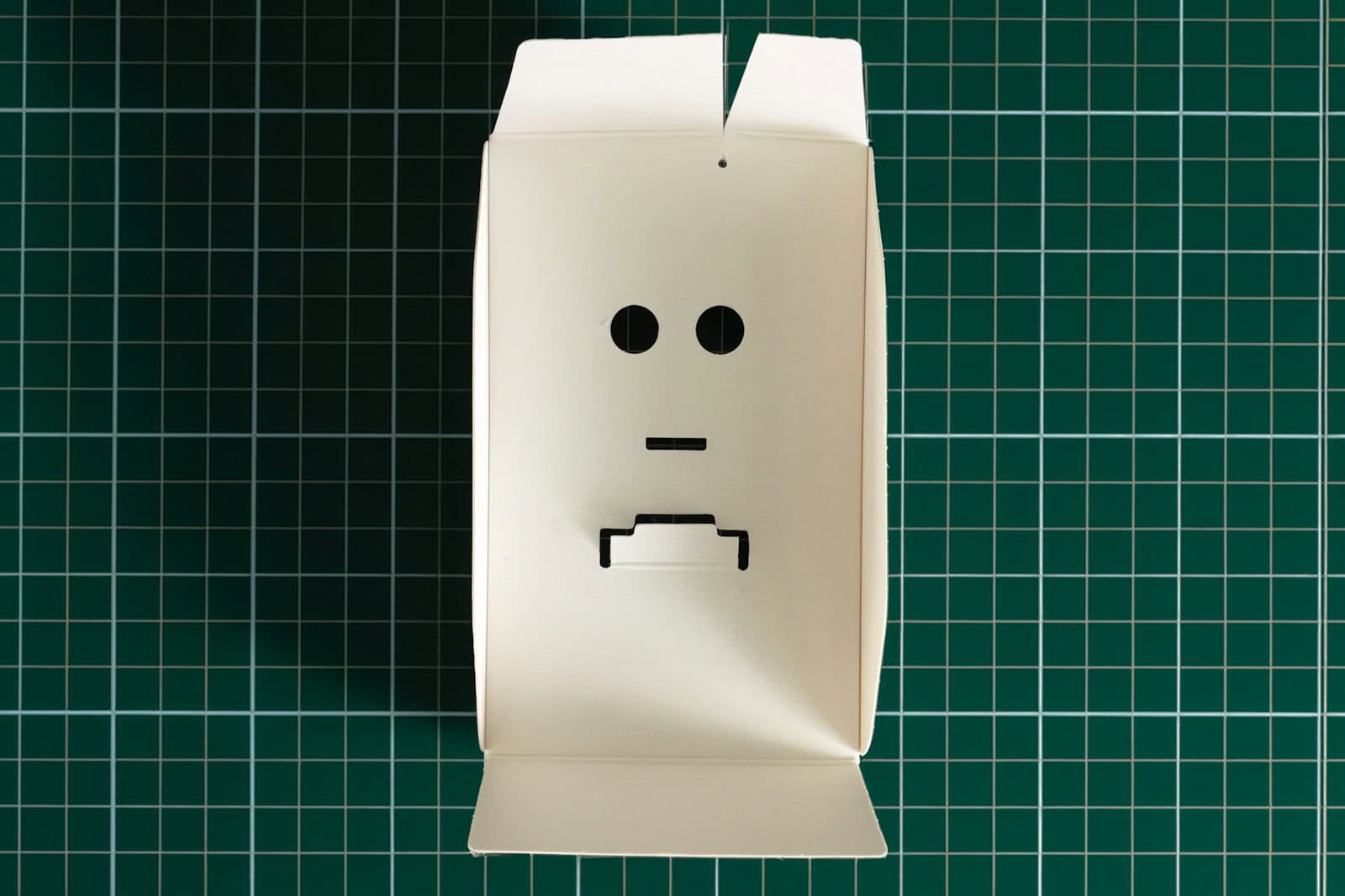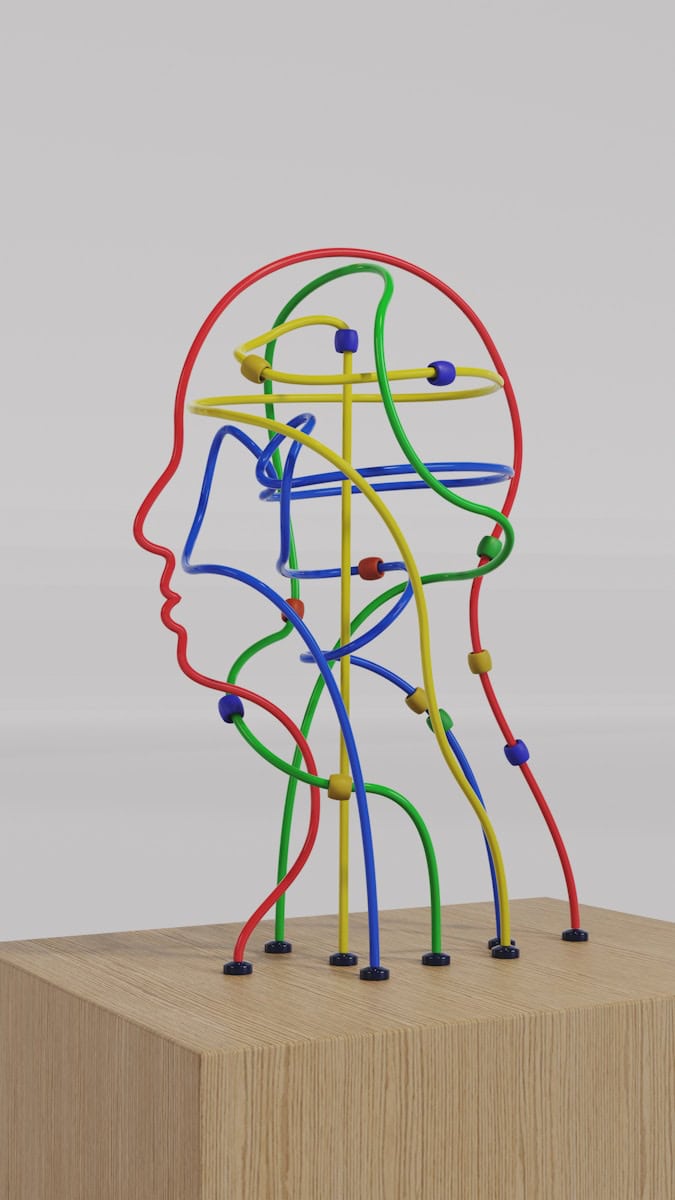The Ultimate Guide to Breaking Unhealthy Habits
Scientists found something weird about people who break unhealthy habits. They don’t use willpower at all. Surprised, right?
Here’s the thing that gets me about this. Society says these patterns are moral failures. Like you just need more discipline. But that’s not how unhealthy habits work.
What Nobody Tells You About These Patterns
Every unhealthy habit serves a purpose for you, there is a reason you have them. Your phone scrolling gives you connection. Your stress eating offers comfort. Your work addiction provides worth.
The problem isn’t that you’re weak. The problem is these patterns no longer work. What once  helped starts hurting you instead. What felt like control becomes the thing controlling you.
helped starts hurting you instead. What felt like control becomes the thing controlling you.
We’re not taught this truth. Unhealthy habits exist to meet real needs. If you don’t address the need, the habit comes back stronger.
Let me be honest with you here. Most people walk around with pain they don’t know they’re carrying. These patterns become ways to numb that pain without dealing with it.
You can’t heal what you won’t feel. Those hard emotions your unhealthy habits help you avoid need attention, not numbing.
The Hidden Pain Behind Every Pattern
Every unhealthy habit has a real story behind it. Something happened that made this pattern feel needed. Maybe not big trauma – sometimes it’s smaller wounds that cut deep over time. These are all coping mechanisms.
The friend who can’t stop shopping might have grown up with money stress. The person who works 80-hour weeks might have learned their worth depends on getting things done. The one who avoids people could be protecting themselves from rejection. Make sense? These are al outdated tools we used once to cope.
This sounds crazy when I say it out loud. But most people develop these patterns as kids to cope with situations they couldn’t handle. Then carry these behaviors into adult life without questioning if they still help.
The breakdown usually creeps in slowly and unnoticed. Physical pains you ignore. Relationships that suffer. Always feeling tired, despite enough sleep. Then one day everything falls apart at once.
It’s really hard when this happens to you. Like your whole identity crumbles. But here’s what I wish someone had told me. This breakdown isn’t failure. It’s your system finally saying “enough” to patterns that were draining your life. Your system is actually trying to get your attention.
How Culture Makes Bad Stuff Normal
Walk around any city and really look at people’s faces. You’ll see worry and rushing in their eyes. No peace, no stillness, no presence at all. We’ve made stress our normal way of living.
The average person checks their phone once every 12 minutes. Spends more time consuming content than creating connections. Works more hours while feeling less happy than people who had less stuff.
This isn’t an accident, we didn’t just arrive here all of a sudden. Entire industries profit from keeping you stuck in patterns that serve them more than you. Yes, we are nothing but cash cows for them, expendable cash cows.
Social media companies hire behavioral scientists to make their apps hard to resist. Food companies create cravings that override your natural hunger signals. Work culture sells solutions to problems it creates.
The most messed up part? They convince you the struggle is your fault. “Just use more willpower.” “Just be more disciplined.” As if individual effort could beat engineered addiction designed by expert teams.
Breaking free from these patterns means questioning whether “normal” is actually healthy for you. Sometimes it means making choices that go against what everyone else is doing.
When Everything Falls Apart
There comes a moment when the systems you built to protect yourself start falling apart. The patterns that once held your life together begin to crumble.
When old ways of coping stop working, space opens for something truly healthy. The collapse creates room for real presence you might never have felt before.
Here’s something I learned the hard way. Healing from these patterns isn’t a destination you reach and you’re done. It’s a practice you develop over time and you stick to, day in day out. And it’s much slower than our quick-fix culture prepares you for.
The first months are the hardest. Without your usual numbing strategies, you feel emotions that were buried for years. Sadness hidden under work and busyness. Loneliness masked by social media. Worry medicated with staying busy.
But slowly – so slowly you barely notice – things shift. More good days than hard ones. Urges toward old patterns become less frequent. New behaviors start feeling natural instead of forced. You are re wiring your brain, this takes time.
What Actually Works for Breaking Unhealthy Habits
Through years of trying different approaches, certain methods proved truly effective:
Change Your Environment to Support Success: Your surroundings shape choices more than willpower ever could. Remove triggers for unhealthy habits instead of trying to resist them with pure determination (this always fails when you are stressed or feeling down). Put barriers between yourself and harmful options. Make healthy choices easier to access. Set yourself up to succeed, not fail.
Shift Your Identity to Match Your Goals: Instead of “I’m trying to quit social media,” say “I value real connection over digital distraction.” Behavior follows identity more reliably than trying to change actions first.
Get Curious About Urges Instead of Fighting: When you feel pulled toward these patterns, notice the physical feelings without judgment. Don’t fight them with willpower or criticism. Urges are like waves – they rise, peak, and naturally fade if you don’t feed them. Take a deep breath and focus on the moment.
Know Your Values and What Matters Most: Get clear on what actually matters to you. When you see how unhealthy habits take you away from your values and goals, choices become easier to make.
Start Tiny with Really Small Changes: Make tiny changes and notice what happens. We all want to jump in big and change our lives in a few days, but this never works. Success builds on success in your brain. Giant changes usually lead to giant failures that make you feel worse about yourself.
Find Support Because Change is Hard Alone: This work is too hard to do alone. Whether therapy, support groups, or trusted friends, having witnesses makes change possible and lasting.
For Anyone Still Fighting Bad Patterns
If you’re reading this while battling behaviors that feel impossible to change, your struggle doesn’t mean you’re failing. It means you’re fighting brain pathways that took years to build. Now you are creating new neural pathways, this takes time.
You’re not broken for having these patterns. They were responses to circumstances that may no longer exist in your current life. They served a purpose, even if that purpose has outlived its usefulness.
The path forward isn’t about perfect execution or dramatic change. It’s about tiny, consistent choices toward what truly feeds your soul and values. It’s about treating yourself with kindness during setbacks and mistakes.
What I discovered by accident during this journey? The goal isn’t getting rid of all unhealthy habits perfectly. It’s developing a different relationship with them. Noticing urges without automatically acting on them. Choosing responses rather than just reacting. You’re human, so stop beating up on yourself.
The real change happens in how you treat yourself. The harsh inner critic softens over time. You learn to listen to your body instead of overriding its signals constantly. You start offering yourself the same kindness you’d give a good friend struggling.
Your unhealthy habits don’t define who you are. They’re simply patterns you learned for protection. And patterns can be unlearned with patience. What emerges when you create space beyond these limits isn’t just the absence of problems. It’s the presence of energy and real connection you may have forgotten was possible.
You don’t have to walk this journey alone.
For expert-backed insights on breaking unhealthy habits, read this guide from Healthline.
20 Common Unhealthy Habits: Their Hidden Meanings
 Let’s decode what twenty common unhealthy habits are really trying to do for you.
Let’s decode what twenty common unhealthy habits are really trying to do for you.
Stress and Emotional Management Habits
1. Stress Eating – Your body is trying to comfort itself when emotions feel too big to handle. Food becomes a hug from the inside when you need soothing.
2. Endless Phone Scrolling – You’re seeking connection and stimulation when life feels empty or boring. The phone promises novelty but delivers emptiness instead.
3. Staying Up Too Late – You’re trying to reclaim time that feels stolen by work or responsibilities. Late night becomes “your time”.
4. Putting Things Off – You’re protecting yourself from potential failure or judgment. Not trying feels safer than trying and possibly failing.
5. Shopping When Upset – You’re trying to fill an emotional hole with physical things. The temporary high of buying something new masks deeper emptiness.
Social and Relationship Habits
6. People Pleasing – You’re trying to avoid conflict and ensure acceptance. Saying yes to everything feels safer than risking someone’s disappointment. This masks the need for approval and love.
7. Avoiding Social Events – You’re protecting yourself from potential rejection or judgment. Staying home guarantees safety but also guarantees loneliness.
8. Gossiping – You’re trying to connect with others and feel included in the group. Sharing secrets creates temporary intimacy but damages trust.
9. Checking Ex’s Social Media – You’re trying to maintain connection or seeking closure that never comes. The checking keeps wounds fresh instead of letting them heal.
10. Always Being Late – You might be rebelling against feeling controlled or trying to make an entrance. Being late gives you a sense of power over time.
Work and Productivity Habits
11. Working Too Much – You’re trying to prove your worth and avoid feelings of inadequacy. Work becomes your identity when other areas feel uncertain.
12. Checking Email Constantly – You’re trying to stay in control and feel important. Each email makes you feel needed even when it adds stress.
13. Starting Projects But Not Finishing – You’re avoiding the vulnerability of completion and potential criticism. Starting feels exciting; finishing feels scary.
14. Multitasking Everything – You’re trying to feel productive and important. Doing many things poorly feels better than focusing on one thing completely.
15. Always Saying “I’m Busy” – You’re trying to feel important and avoid deeper conversations or commitments that might be uncomfortable.
Health and Self-Care Habits
16. Skipping Exercise – You might be protecting yourself from body shame or avoiding the discomfort of being a beginner at something.
17. Eating When Not Hungry – You’re trying to fill emotional hunger with physical food. Eating becomes a way to push down feelings you don’t want to face.
18. Hitting Snooze Repeatedly – You’re trying to delay facing a day that feels overwhelming or meaningless. Those extra minutes in bed feel like borrowed peace.
19. Ignoring Medical Issues – You’re avoiding potential bad news or trying to maintain the illusion that you’re invincible and don’t need help.
20. Negative Self-Talk – You’re trying to beat others to the punch by criticizing yourself first. It feels like protection but becomes self-sabotage.
Each of these patterns started as a solution to a problem. The behavior made sense when you first developed it. Understanding the “why” behind your habits is the first step to changing them with compassion instead of criticism.
Toxic Traits: Why We Develop Them and How to Heal (Part 1)







